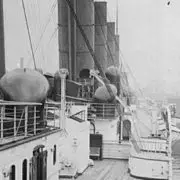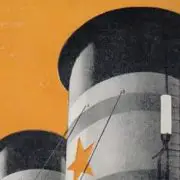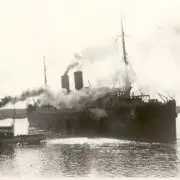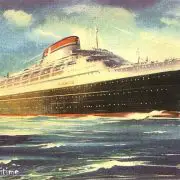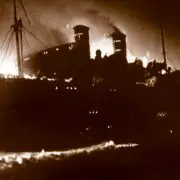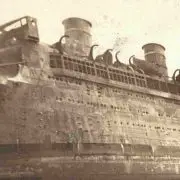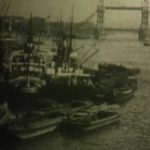Recalling the USS Indianapolis
I was in the water, I was swimming away from the ship in the dark… I heard the loudest, worst noise I’d ever heard
Interview by Jim Kalafus
Cleatus Lebow smiles easily. He is a friendly man, soft spoken, with a pleasant Texas inflection, and immediately puts one at ease upon first meeting. A 48 year resident of Memphis, Texas, he and his wife are active in the Hall County Historical Society, and maintain a comfortable red brick home in a nice neighborhood.
We sit in the formal front room of his house, on a sunny day in March 2007 ~ the sort of early spring day that invariably puts one in a good mood, and the sort of day on which thoughts of death, violence and tragedy seem a million miles away. The day, and Mr. Lebow’s easy-going demeanor, are distinctly at odds with our conversational subject; the week in 1945 when Cleatus survived the sinking of the U.S.S. Indianapolis, and nearly 900 of his shipmates and friends did not. A model of the Indianapolis sits on the mantle, a copy of Only 317 Survived is on the coffee table, and U.S.S. Indianapolis hat is carefully placed on a chair just inside the entry to the dining room. We exchange small talk about the weather, and of an unfortunate incident of vandalism at the school in Cleatus’ Indianapolis-era hometown in which display cases were smashed and trophies- some of which he helped win before the war- were damaged, and then settle in to a recounting of Mr. Lebow’s experiences in World War 2, and the disaster.
I was drafted. I didn’t enlist. I got married in December, 1941, about two months before I turned 18, and we had a kid, and so I was drafted. I entered service from Abernathy Texas, and was inducted into the Navy in Lubbock in February 1943.
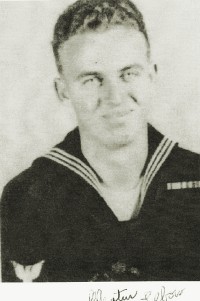 |
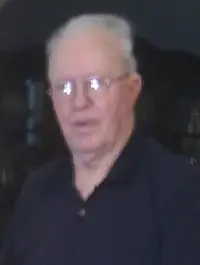 |
| Cleatus Lebow | |
In December 1943, I sailed from San Diego on a minesweeper. A big storm came up and we put into San Francisco, where I did thirty days shore duty. I didn’t have too much to do (Laughs) except once I had to escort a prisoner up from San Diego- he’d jumped ship- he was a big guy, 6’ 2” and I weighed all of 130 pounds. I was handcuffed to him and there were two S.P.s on the train who asked “Who was escorting who?” (Laughs)
Then in January 1944 I was sent to Pearl Harbor on this L.S.T. It took ten days. They had just finished raising the U.S.S. Oklahoma, that had been sunk in December 1941. Now, the cleanup work….we got down through three decks, and there was a lot of mess to clean out and remove. Body parts. It was scary down there. We did that, did some work at Pearl Harbor and then after three days they called nine of us away~ and that is when I ended up on the Indianapolis.
Iwo Jima. We (meaning the Americans) bombarded the Japanese who were dug in there, but they were so well dug in that there had to be a second bombardment, and then after that men still had to go in with flamethrowers and put them up to those slots in the bunkers and drive them out. My position as a range finder operator gave me a ringside view when they raised the American flag on Mount Suribachi. I went below and asked one of the officers if Iwo Jima had been secured, and he said ‘no’ and I said to him, ‘well, we just raised the flag’ and he said ‘Lebow, you must be crazy.’

Raising the flag
From Iwo Jima, we went to continue the bombardment on Okinawa before the landing there.
In March, March 31st,1945, we were hit by a suicide bomber. There were nine sailors killed, and after we were patched up we put in to Vallejo for repairs. I still have a piece of the suicide plane buried away here. A lot of the men kept pieces, had them made into bracelets. I left mine home on my last leave, so I never made it into a bracelet.
I went home, to Abernathy, Texas, on leave that June. I was outside playing touch football with my brothers and sisters- I had eleven brothers and sisters, so we had enough for our own team (laughs)- and when I went into the house to get a drink, my mother came up to me and said ‘Cleatus, what’s wrong?’ and I said ‘nothing.’ She said “There’s something bothering you. What’s wrong?” and so I told here that I was dreading going back to the ship. I didn’t want to go. I had…I knew that something dreadful was going to happen. She said to me ‘I wish I could go in your place, but I can’t. But, we both know who can go with you’ and I knew what she meant and I said ‘Yes, I know, Jesus can go with me.’
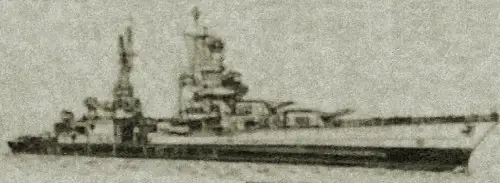
USS Indianapolis
I returned to the ship. Now, before we sailed, this crate was brought on board. It was, oh, about the size of this room, maybe a little smaller. It was the atomic bomb, that we dropped on Hiroshima, but of course no one knew that. Later, Captain McVay said he didn’t know. There were jokes- that it was a Cadillac car for Douglas McArthur, or maybe a crate of special soft toilet paper for the officers. I remember that there were four marine guards, one on each side of it. We delivered the bomb to Tinian Island, went to Guam, and then we sailed, intending to go to the Philippines and meet the rest of the fleet there.
Captain McVay had requested an escort ship, but was told that there were no enemy subs along our route. Not to worry…
I had a CPO in my division that was giving me a little trouble. I’d passed my written test for FC 2C, but he didn’t want to give it to me for ‘practical factors.’ Our division officer was sure I could do the work and gave me the test that afternoon. (July 30, 1945) I passed. Now, that officer asked me to move my quarters from where I slept, aft, to up forward by sick bay and the powder magazine for the two forward gun turrets. I told him I had to go on watch at 1600 hours, and he said it was okay to wait until the next day. Now, if I had gone to that bunk, I’d still be there.
That night, I went to my locker, got my towel and soap, and went to a shower room forward. Normally I used the aft one, near where I bunked, but…well…maybe it was dirty, and I ended up going forward.
On my way back, I met some fellows who had made some powdered lemonade. So, I had some lemonade and then went back and laid down on my bunk.
I was in my bunk when the two torpedoes hit. Our after compartment wasn’t damaged. I went to my locker, put on a shirt and pants, and took a pair of slippers from under my mattress and went upon deck. Now, on the quarterdeck were a lot of men who were injured- burned- and they were calling for doctors. I went to the fire control workshop, and passed out some life jackets there. We went down a deck, two friends and I, and tried to push a lifeboat out. But, we couldn’t because of the list. It was a big, heavy, whale boat. The ship was listing heavy to starboard, and I said that we should get out of there. We were on the ladder when the ship rolled hard again, and that lifeboat crashed in and crushed several men against the bulkhead.
By that time, the ship was pretty well over and down in the water, and men were climbing over the rail and walking down her side. My friends, Smitty and Gaither, and I climbed over on to the side and that was the last I ever saw of them. They were my best friends on the ship. Now, one of the horrible things we saw was that the ship was low down in the water, and the propellers were still (rotating motion with his finger) and some of the men jumped down between them. One who got killed was a cook…baker…. Now, I can remember we’d lay in our bunks and smell that fresh bread baking and think about how good it smelled. And one of the men would say “who’s going to go in and get it?” Big chunks of fresh bread. Anyway, he got hit, it came around and must have smashed his skull.
When I was in the water, I was swimming away from the ship in the dark, trying to get away from the suction when she sank. And I heard the loudest…worst…noise I’d ever heard and I looked behind me, and the after end, the stern, was sticking straight up into the air. Then she went down, fast, but there was no suction. Men who were closer to the ship than I was also said there was no suction, but some of those who were on her when she sank said they were pulled down with her.
I was scared, but then I remembered what my mother said about Jesus, and then I wasn’t scared any more.
I heard some voices calling, and swam to them. It was a life raft. We put the seriously injured men- burned-in it and the rest of us held on. A cargo net, one of those big nets, floated up and we pulled that in, too.
I was wearing a shirt, and a lot of the men weren’t. I tore pieces off the tail of that shirt so that men who didn’t have hats could (indicates making a head-wrap) keep the sun off during the day. There was no food, no water.
A plane flew over at night. Of course, there was no chance they would see us.
We were finally spotted by a plane. Now, the pilot, Chuck Gwinn, was making a repair on a piece of equipment, an antenna and he looked down at the water and saw an oil slick. He thought he’d found a Japanese submarine, but when he flew in lower he began to see things in the water. Then he saw there were people in the water, and there were sharks attacking some of the people…
He reported what he’d seen, but they told him he was wrong- there were no big ships missing, but maybe it was the crew of a big plane- a B-29. So a plane came in, a PBY, and landed, he landed right on the water. That first plane took the seriously injured, so I wasn’t in it. The pilot, Adrian Marks, got 56 men in it and took off.
There was life raft that one of the planes dropped and we got in it. Spent the night cranking that radio.
While the plane was picking up the injured, I jumped into the water and started swimming. And, my friend Clarence Herschberger, he jumped in and pulled me back. Well, I jumped in again and started swimming, and Herschberger jumped in again and pulled me back. He said to me ‘Lebow, what are you doing?’ and I said ‘See that big box of parts? We can swim to it and fix that plane and take off.’ That’s how…that’s how my mind was. And Herschberger said to me ‘It’s starting to get dark. Why don’t we wait until morning?’ When my head cleared, I apologized to him for making him use up his strength pulling me back.
Finally, a boat from the U.S.S. Bassett picked us up. I remember climbing up that ladder, and that’s all I remember. I weighed 130 pounds before the ship sank, and 100 pounds when I was taken to the hospital. From there I was taken to a submarine rest camp in Guam for 30 days. You could get whatever food you wanted there- I never saw so much good food in the Navy. Ice cream….
I came back to the United States, San Diego, aboard the U.S.S. Hollandia. I was given 30 day survivor leave, went home to Abernathy Texas, and then went back to California where I was honorably discharged.
I was given two shirts, two pairs of pants. Socks. Underthings. Whites. Shoes. When I got home, I’d been sent a bill for $35 for these clothes. Well, I wrote them a letter- I won’t say what I said, but it would set this room on fire-and then I got another letter from someone in the Navy saying that the debt was forgotten. Forgiven.
How did I deal with the Indianapolis? Well, I didn’t want to think about it but, of course, I kept thinking of it. I had a big boil on my foot from being in the water that took a long time to heal and every time I looked at that thing I was reminded. I had another lanced on my hand (shows scar) and that reminded me, too. I tried not to think about it.
We moved up here to Memphis in 1959. In 1960 we had the first Indianapolis reunion, and that was when I started talking about it again. At first we had the reunion every year, and then decided it was better to have them every two years. In between, we have mini-reunions. There are 84 survivors still alive.
If they find the wreck do I mind if they explore it? I’d like them to go in it! I had 69 silver dollars in my locker, and they are still there. I had a $95 watch my wife gave me at Christmas in that locker.
The movie? (Mission of the Shark) They got most of the details right, but some of it was over-done. Oh, there were sharks, but that part was overdone.
Do I think Captain McVay was railroaded? Yes, I do and there are 83 others who agree with me. You know, the commander of the Japanese sub testified at his court martial that it didn’t matter if we were zig-zagging or not- he would have gotten us either way.
The commander of the submarine. Hashimoto. His grand-daughter and great-grandson came to one of the reunions. You know…you can’t hold anything against the family. They weren’t born in 1945, they had nothing to do with it. The great-grandson, he’s a naturalized American and we gave him a flag, and he got up and sang “God Bless America” with the other children.

ONLY 317 Survived: Mr. Lebow had, on hand, a carton of the U.S.S. Indianapolis Survivors Organization’s hardcover book, Only 317 Survived, a profusely illustrated 516 page work, the proceeds from the sale of which go to benefit survivors of the disaster. The book is a collection of first person accounts written by those who were aboard the U.S.S. Indianapolis on her fatal voyage, or their descendants. There are also biographic profiles of the majority of the survivors. It can be order, for $30, at http://www.ussindianapolis.org/317.htm and is well worth the cover price.

